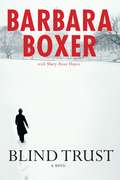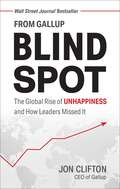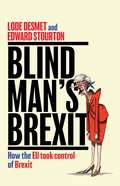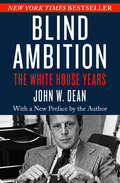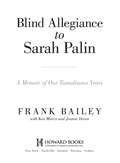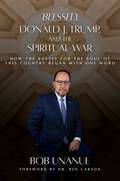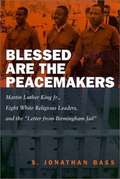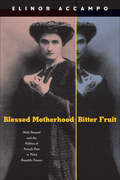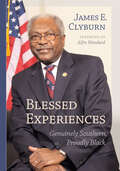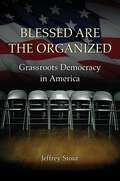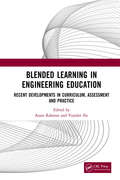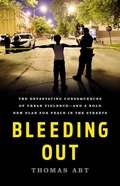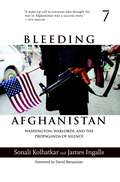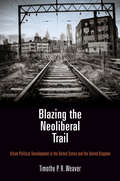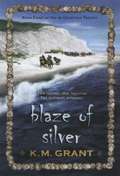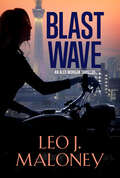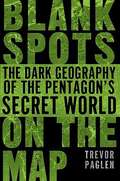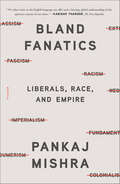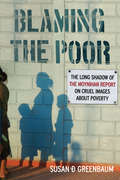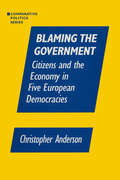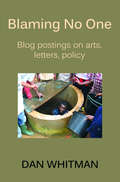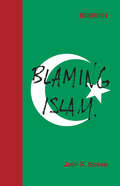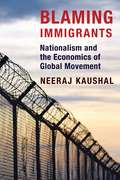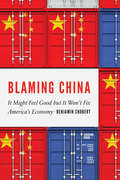- Table View
- List View
Blind Trust
by Barbara Boxer Mary-Rose HayesNow married (to a Republican!) and in her second term, United States Senator Ellen Fisher (Democrat) is about to chair explosive hearings on Homeland Security. Before she goes head to head with the Vice President, whose excessive zeal in enforcing national security has begun to infringe on individual liberties, Ellen and her staff become the subjects of a barrage of charges and attacks that threaten their safety, as well as her career and marriage. This second novel by Senator Barbara Boxer is the story of dirty tricks and political survival, and the battle for integrity in the corridors of power. Combining the personal and the political, Blind Trust is an intriguing insider's view of what goes on behind closed doors in Washington, D.C.
Blind Spot: The Global Rise of Unhappiness and How Leaders Missed It
by Jon CliftonThe rising unhappiness that leaders didn&’t see Unhappiness has been increasing globally for a decade, according to Gallup — and its rise has been missed by almost every world leader.That&’s because while leaders pay close attention to measures like GDP or unemployment, almost none of them track their citizens&’ wellbeing. The implications of this blind spot are significant and far-reaching — leaders missed the citizen unhappiness that triggered events ranging from the Arab uprisings to Brexit to the election of Donald Trump. What are they going to miss next? Grounded in Gallup&’s global research, Blind Spot makes the urgent case that leaders should measure and quantify wellbeing and happiness — how citizens&’ lives are going — and shows them how. It also discusses the five key elements of a great life and where the world needs to improve in each of them to better the lives of people everywhere.
Blind Man's Brexit: How the EU Took Control of Brexit
by Edward Stourton Lode DesmetWith all the political infighting in British politics over Brexit dominating the news cycle, we almost forgot who we were negotiating with. Now, in Blind Man's Brexit, we get to see and hear exactly what was going on in the corridors of power in Brussels, and how the EU comprehensively outmanoeuvred the UK government. When Lode Desmet met Guy Verhofstadt, the European Parliament's representative on Brexit, about filming a fly-on-the-wall documentary on the negotiations, he could never have imagined the unique access he would be granted and the extraordinary story that he would end up filming. As the cameras rolled, Lode sat in on private conversations with chief negotiator Michel Barnier and saw first hand how Theresa May's government's negotiating positions were knocked back time after time. The results were aired in the BBC documentary series Brexit: Behind Closed Doors. Written with distinguished political commentator Edward Stourton, who also provides a British perspective on events, Blind Man's Brexit goes beyond the documentary to reveal a staggering and unprecedented failure of diplomacy on one side and contrasts the very clearly defined aims and goals of the EU side. Many books have attempted to tell the story of what happened, but this one has completely unfiltered access to events as viewed by the EU, and shows exactly why, how and where the Brexit negotiations went so spectacularly wrong, resulting in our departure from the EU being delayed beyond 29 March 2019 as the UK was left in limbo and its political system in disarray.
Blind Ambition: The White House Years
by John W. DeanA six-month New York Times bestseller: &“Not only the best Watergate book, but a very good book indeed&” (The Sunday Times). As White House counsel to Richard Nixon, a young John W. Dean was one of the primary players in the Watergate scandal—and ultimately became the government&’s key witness in the investigations that ended the Nixon presidency. After the scandal subsided, Dean rebuilt his career, first in business and then as a bestselling author and lecturer. But while the events were still fresh in his mind, he wrote this remarkable memoir about the operations of the Nixon White House and the crisis that led to the president&’s resignation. Called &“fascinating&” by Commentary, which noted that &“there can be little doubt of [Dean's] memory or his candor,&” Blind Ambition offers an insider&’s view of the deceptions and machinations that brought down an administration and changed the American people&’s view of politics and power. It also contains Dean&’s own unsparing reflections on the personal demons that drove him to participate in the sordid affair. Upon its original publication, Kirkus Reviews hailed it &“the flip side of All the President&’s Men—a document, a minefield, and prime entertainment.&” Today, Dean is a respected and outspoken advocate for transparency and ethics in government, and the bestselling author of such books as The Nixon Defense, Worse Than Watergate, and Conservatives Without Conscience. Here, in Blind Ambition, he &“paints a candid picture of the sickening moral bankruptcy which permeated the White House and to which he contributed. His memory of who said what and to whom is astounding&” (Foreign Affairs).
Blind Allegiance to Sarah Palin: A Memoir of Our Tumultuous Years
by Jeanne Devon Frank Bailey Ken MorrisThis explosive, up-close view of Sarah Palin comes from an inner-circle confidant who shares surprising information about how Sarah dealt with staff and perceived "enemies," and the discrepancy between what she said and what she did.
Blessed, Donald J. Trump, and the Spiritual War: How the Battle for the Soul of This Country Began with One Word
by Bob UnanueOn July 9th, 2020, Bob Unanue, the CEO of Goya Foods, became the target of cancel culture. His crime? He used the word &“blessed&” to describe the country under President Donald J. Trump. This is the incredible true story of one man&’s belief in standing up for America and doing what&’s right.One single word—Blessed. This was enough to nearly cancel Bob Unanue. Unanue may be a humble, philanthropic man determined to better the world, but he is no sheep. The normally mild-mannered CEO stared down the hatred, division, and destruction of cancel culture and came out victorious on the other side. Blessed, Donald J. Trump, and the Spiritual War is about the power of courage and faith, and how they shaped one of the greatest stories of Hispanic success in American history and will lead a lost America back to the godly principles that built it.
Blessed are the Peacemakers: Martin Luther King Jr., Eight White Religious Leaders, and the "Letter from Birmingham Jail"
by S. Jonathan BassMartin Luther King Jr.'s "Letter from Birmingham Jail" is arguably the most important written document of the civil rights protest era and a widely read modern literary classic. Personally addressed to eight white Birmingham clergymen who sought to avoid violence by publicly discouraging King's civil rights demonstrations in Birmingham, the nationally published "Letter" captured the essence of the struggle for racial equality and provided a blistering critique of the gradualist approach to racial justice. It soon became part of American folklore, and the image of King penning his epistle from a prison cell remains among the most moving of the era. Yet as S. Jonathan Bass explains in the first comprehensive history of King's "Letter," this image and the piece's literary appeal conceal a much more complex tale.
Blessed Motherhood, Bitter Fruit: Nelly Roussel and the Politics of Female Pain in Third Republic France
by Elinor AccampoNelly Roussel (1878–1922)—the first feminist spokeswoman for birth control in Europe—challenged both the men of early twentieth-century France, who sought to preserve the status quo, and the women who aimed to change it. She delivered her messages through public lectures, journalism, and theater, dazzling audiences with her beauty, intelligence, and disarming wit. She did so within the context of a national depopulation crisis caused by the confluence of low birth rates, the rise of international tensions, and the tragedy of the First World War. While her support spread across social classes, strong political resistance to her message revealed deeply conservative precepts about gender which were grounded in French identity itself. In this thoughtful and provocative study, Elinor Accampo follows Roussel's life from her youth, marriage, speaking career, motherhood, and political activism to her decline and death from tuberculosis in the years following World War I. She tells the story of a woman whose life and work spanned a historical moment when womanhood was being redefined by the acceptance of a woman's sexuality as distinct from her biological, reproductive role—a development that is still causing controversy today.
Blessed Experiences: Genuinely Southern, Proudly Black
by James E. Clyburn“Shares lessons learned on his way from the Jim Crow South to a top spot on Capitol Hill . . . [a] remarkably candid new memoir” —NPRFrom his humble beginnings in Sumter, South Carolina, to his prominence on the Washington, D.C., political scene as the third highest-ranking Democrat in the House of Representatives, US Congressman James E. Clyburn has led an extraordinary life. In Blessed Experiences, Clyburn tells in his own inspirational words how an African American boy from the Jim Crow-era South was able to beat the odds to achieve great success and become, as President Barack Obama describes him, “one of a handful of people who, when they speak, the entire Congress listens.”Born in 1940 to a civic-minded beautician and a fundamentalist minister, Clyburn began his ascent to leadership at the age of twelve, when he was elected president of his National Association for the Advancement of Colored People (NAACP) youth chapter. He broke barriers through peaceful protests and steadfast beliefs in equality and justice. As a civil rights leader at South Carolina State College, as human affairs commissioner under John C. West and three subsequent governors, and as South Carolina’s first African American congressman since 1897, Clyburn has established a long and impressive record of public leadership and advocacy for human rights, education, historic preservation, and economic development.Includes a foreword from Emmy Award–winning actress and the congressman’s longtime friend Alfre Woodard“Blessed Experiences has captured not just the history of this tireless leader’s more-than-four decades in public service, but also a sense of the times.” —Warren Buffett
Blessed Are the Organized: Grassroots Democracy in America
by Jeffrey StoutHow ordinary citizens band together to bring about real changeIn an America where the rich and fortunate have free rein to do as they please, can the ideal of liberty and justice for all be anything but an empty slogan? Many Americans are doubtful, and have withdrawn into apathy and cynicism. But thousands of others are not ready to give up on democracy just yet. Working outside the notice of the national media, ordinary citizens across the nation are meeting in living rooms, church basements, synagogues, and schools to identify shared concerns, select and cultivate leaders, and take action. Their goal is to hold big government and big business accountable. In this important new book, Jeffrey Stout bears witness to the successes and failures of progressive grassroots organizing, and the daunting forces now arrayed against it.Stout tells vivid stories of people fighting entrenched economic and political interests around the country. From parents and teachers striving to overcome gang violence in South Central Los Angeles, to a Latino priest north of the Rio Grande who brings his parish into a citizens' organization, to the New Orleans residents who get out the vote by taking a jazz band through streets devastated by Hurricane Katrina, Stout describes how these ordinary people conceive of citizenship, how they acquire and exercise power, and how religious ideas and institutions contribute to their successes.The most important book on organizing and grassroots democracy in a generation, Blessed Are the Organized is a passionate and hopeful account of how our endangered democratic principles can be put into action.
Blended Learning in Engineering Education: Recent Developments in Curriculum, Assessment and Practice
by Ataur Rahman Vojislav IlicBlended Learning combines the conventional face-to-face course delivery with an online component. The synergetic effect of the two modalities has proved to be of superior didactic value to each modality on its own. The highly improved interaction it offers to students, as well as direct accessibility to the lecturer, adds to the hitherto unparalleled learning outcomes. "Blended Learning in Engineering Education: Recent Developments in Curriculum, Assessment and Practice" highlights current trends in Engineering Education involving face-to-face and online curriculum delivery. This book will be especially useful to lecturers and postgraduate/undergraduate students as well as university administrators who would like to not only get an up-to-date overview of contemporary developments in this field, but also help enhance academic performance at all levels.
Bleeding Out: The Devastating Consequences of Urban Violence--and a Bold New Plan for Peace in the Streets
by Thomas AbtFrom a Harvard scholar and former Obama official, a powerful proposal for curtailing violent crime in America Urban violence is one of the most divisive and allegedly intractable issues of our time. But as Harvard scholar Thomas Abt shows in Bleeding Out, we actually possess all the tools necessary to stem violence in our cities.Coupling the latest social science with firsthand experience as a crime-fighter, Abt proposes a relentless focus on violence itself -- not drugs, gangs, or guns. Because violence is "sticky," clustering among small groups of people and places, it can be predicted and prevented using a series of smart-on-crime strategies that do not require new laws or big budgets. Bringing these strategies together, Abt offers a concrete, cost-effective plan to reduce homicides by over 50 percent in eight years, saving more than 12,000 lives nationally. Violence acts as a linchpin for urban poverty, so curbing such crime can unlock the untapped potential of our cities' most disadvantaged communities and help us to bridge the nation's larger economic and social divides.Urgent yet hopeful, Bleeding Out offers practical solutions to the national emergency of urban violence -- and challenges readers to demand action.
Bleeding Afghanistan: Washington, Warlords, and the Propaganda of Silence
by David Barsamian Sonali Kolhatkar James IngallsThrough in-depth research and detailed historical context, Sonali Kolhatkar and James Ingalls report on the injustice of U.S. policies in Afghanistan historically and in the post-9/11 era. Drawing from declassified government documents and on-the-ground interviews with Afghan activists, journalists, lawyers, refugees, and students, Bleeding Afghanistan examines the connections between the U.S. training and arming of Mujahideen commanders and the subversion of Afghan democracy today. Bleeding Afghanistan boldly critiques the exploitation of Afghan women to justify war by both conservatives and liberals, analyzes uncritical media coverage of U.S. policies, and examines the ways in which the U.S. benefits from being in Afghanistan.
Blazing the Neoliberal Trail
by Timothy P. WeaverIn Blazing the Neoliberal Trail, Timothy Weaver asks how and why urban policy and politics have become dominated, over the past three decades, by promarket thinking. He argues that politicians such as Ronald Reagan and Margaret Thatcher targeted urban areas as part of their far broader effort to remake the relationship between markets, states, and citizens. But while neoliberal policies were enacted in both the United States and the United Kingdom, Weaver shows that there was significant variation in the ways in which neoliberal ideas were brought to bear on institutional frameworks and organized interests. Moreover, these developments were not limited to a 1980s right-wing effort but were also advanced by Bill Clinton and Tony Blair, whose own agendas ultimately reinforced neoliberal ideas and practices, though often by default rather than design. The enduring impact of these shifts is evidenced today by the reintroduction of enterprise zones in the United Kingdom by Chancellor of the Exchequer George Osborne and by President Obama's announcement of Promise Zones, which, despite appearances, are cast in the neoliberal mold.By highlighting the bipartisan nature of the neoliberal turn, Weaver challenges the dominant narrative that the revival of promarket policies was primarily driven by the American GOP and the United Kingdom's Conservative Party. Drawing on extensive archival research and interviews with key political actors, Weaver examines national-level policies, such as enterprise zones--place-based articulations of neoliberal ideas--in case studies of Philadelphia and London. Through an investigation of national urban policy and local city politics, Blazing the Neoliberal Trail shows how elites became persuaded by neoliberal ideas and remade political institutions in their image.
Blaze of Silver
by K. M. GrantCan a knight sacrifice everything he holds sacred in service to his king? King Richard is being held for ransom in Germany, and England is in chaos without a sovereign. The de Granvilles must deliver the treasure that will win their King's freedom. But the Old Man of the Mountain, leader of the Assassins, is ready to take his revenge on Kamil. To do so he will orchestrate a great betrayal, and his tentacles of treachery reach far and deep. Kamil is determined to prevail -- the Old Man must not win. But when all trust has been shattered, who can he turn to for help? The fate of a king, the bonds of a friendship, and the depth of an enduring love will all be in jeopardy as Will, Ellie, Kamil, and Hosanna face the ultimate loyalty test, and their final battle.
Blast Wave (An Alex Morgan Thriller)
by Leo J. MaloneyFrom the clandestine corridors of power in London to Tokyo&’s historic underground, Alex Morgan fights The newest installment in acclaimed Black-Ops thriller author Leo J. Maloney&’s spin-off series featuring Alex Morgan, daughter of Zeta operative Dan Morgan. BLAST WAVE A sniper attack in London&’s Trafalgar Square triggers the survive-and-protect instincts of Alex Morgan, special agent of the Zeta organization. As the city erupts into chaos, Alex knows it&’s only the first move by the vicious Ares network. Fast-moving events propel her to Tokyo, where Yoki-Dyne, a lucrative and innovative tech company, is under attack. Alex takes a deep dive into the heart of danger, only to encounter a female operative who may be her best ally – or her worst foe. It&’s a race against time to fortify Yoki-Dyne, safeguard the future of Western democracy, and extinguish every threat that stands in her way. Praise for Leo J. Maloney and His Novels&“Fine writing and real insider knowledge.&” —Lee Child&“The new master of the modern spy game.&”—Mark Sullivan&“Utterly compelling.&” —Jeffery Deaver &“Rings with authenticity.&”—John Gilstrap&“A ripping story!&”—Meg Gardiner
Blank Spots on the Map
by Trevor PaglenWelcome to a top-level clearance world that doesn't exist. . . Now with updated material for the paperback edition. This is the adventurous, insightful, and often chilling story of a road trip through a shadow nation of state secrets, clandestine military bases, black sites, hidden laboratories, and top-secret agencies that make up what insiders call the "black world. " Here, geographer and provocateur Trevor Paglen knocks on the doors of CIA prisons, stakes out a covert air base in Nevada from a mountaintop 30 miles away, dissects the Defense Department's multibillion dollar "black" budget, and interviews those who live on the edges of these blank spots. Whether Paglen reports from a hotel room in Vegas, a secret prison in Kabul, or a trailer in Shoshone Indian territory, he is impassioned, rigorous, relentless-and delivers eye-opening details. .
Bland Fanatics: Liberals, Race, and Empire
by Pankaj MishraA wide-ranging, controversial collection of critical essays on the political mania plaguing the West by one of the most important public intellectuals of our time.In America and in England, faltering economies at home and failed wars abroad have generated a political and intellectual hysteria. It is a derangement manifested in a number of ways: nostalgia for imperialism, xenophobic paranoia, and denunciations of an allegedly intolerant left. These symptoms can be found even among the most informed of Anglo-America.In Bland Fanatics, Pankaj Mishra examines the politics and culture of this hysteria, challenging the dominant establishment discourses of our times. In essays that grapple with the meaning and content of Anglo-American liberalism and its relations with colonialism, the global South, Islam, and “humanitarian” war, Mishra confronts writers such as Jordan Peterson, Niall Ferguson, and Salman Rushdie. He describes the doubling down of an intelligentsia against a background of weakening Anglo-American hegemony, and he explores the commitments of Ta-Nehisi Coates and the ideological determinations of The Economist. These essays provide a vantage point from which to understand the current crisis and its deep origins.
Blaming the Victims: Spurious Scholarship and the Palestinian Question
by Edward W. Said Christopher HitchensCrimes happen everywhere in this world, this book provides stories of the victims, what and how they have been through.
Blaming the Poor
by Susan D. GreenbaumIn 1965, the late Senator Daniel Patrick Moynihan--then a high-ranking official in the Department of Labor--sparked a firestorm when he released his report "The Negro Family," which came to be regarded by both supporters and detractors as an indictment of African American culture. Blaming the Poor examines the regrettably durable impact of the Moynihan Report for race relations and social policy in America, challenging the humiliating image the report cast on poor black families and its misleading explanation of the causes of poverty. A leading authority on poverty and racism in the United States, Susan D. Greenbaum dismantles Moynihan's main thesis--that the so called matriarchal structure of the African American family "feminized" black men, making them inadequate workers and absent fathers, and resulting in what he called a tangle of pathology that led to a host of ills, from teen pregnancy to adult crime. Drawing on extensive scholarship, Greenbaum highlights the flaws in Moynihan's analysis. She reveals how his questionable ideas have been used to redirect blame for substandard schools, low wages, and the scarcity of jobs away from the societal forces that cause these problems, while simultaneously reinforcing stereotypes about African Americans. Greenbaum also critiques current policy issues that are directly affected by the tangle of pathology mindset--the demonization and destruction of public housing; the criminalization of black youth; and the continued humiliation of the poor by entrepreneurs who become rich consulting to teachers, non-profits, and social service personnel. A half century later, Moynihan's thesis remains for many a convenient justification for punitive measures and stingy indifference to the poor. Blaming the Poor debunks this infamous thesis, proposing instead more productive and humane policies to address the enormous problems facing us today.
Blaming the Government: Citizens and the Economy in Five European Democracies
by Christopher A. AnzaloneThis work examines the impact of macroeconomic conditions on public support for the government in Britain, France, Netherlands, Denmark and Germany.
Blaming No One: Blog Postings on Arts, Letters, and Policy
by Dan WhitmanPersonal and professional reflections from a former US Foreign Service officer.This book is a series of reflections at the point of retirement from the U.S. Foreign Service after a career spent in locations around the globe. The collection of public blog postings, all colored by the author’s experience, include short essays on the following themes: personal anecdote, people/profiles, foreign policy as seen by a mid-level official, human nature, government functions, and “other”—ranging from music to immigration to condominium rules on dog comportment. Marked by a tone of light humor and social and institutional criticism, Blaming No One is an easy, entertaining read that also questions and challenges facile suppositions and notes many historic moments of interest.
Blaming Islam (Boston Review)
by John R. BowenWhy fears about Muslim integration into Western society—propagated opportunistically by some on the right—misread history and misunderstand multiculturalism. In the United States and in Europe, politicians, activists, and even some scholars argue that Islam is incompatible with Western values and that we put ourselves at risk if we believe that Muslim immigrants can integrate into our society. Norway's Anders Behring Breivik took this argument to its extreme and murderous conclusion in July 2011. Meanwhile in the United States, state legislatures' efforts to ban the practice of Islamic law, or sharia, are gathering steam—despite a notable lack of evidence that sharia poses any real threat.In Blaming Islam, John Bowen uncovers the myths about Islam and Muslim integration into Western society, with a focus on the histories, policy, and rhetoric associated with Muslim immigration in Europe, the British experiment with sharia law for Muslim domestic disputes, and the claims of European and American writers that Islam threatens the West. Most important, he shows how exaggerated fears about Muslims misread history, misunderstand multiculturalism's aims, and reveal the opportunism of right wing parties who draw populist support by blaming Islam.
Blaming Immigrants: Nationalism and the Economics of Global Movement
by Neeraj KaushalImmigration is shaking up electoral politics around the world. Anti-immigration and ultranationalistic politics are rising in Europe, the United States, and countries across Asia and Africa. What is causing this nativist fervor? Are immigrants the cause or merely a common scapegoat?In Blaming Immigrants, economist Neeraj Kaushal investigates the rising anxiety in host countries and tests common complaints against immigration. Do immigrants replace host country workers or create new jobs? Are they a net gain or a net drag on host countries? She finds that immigration, on balance, is beneficial to host countries. It is neither the volume nor pace of immigration but the willingness of nations to accept, absorb, and manage new flows of immigration that is fueling this disaffection. Kaushal delves into the demographics of immigrants worldwide, the economic tides that carry them, and the policies that shape where they make their new homes. She demystifies common misconceptions about immigration, showing that today’s global mobility is historically typical; that most immigration occurs through legal frameworks; that the U.S. system, far from being broken, works quite well most of the time and its features are replicated by many countries; and that proposed anti-immigrant measures are likely to cause suffering without deterring potential migrants. Featuring accessible and in-depth analysis of the economics of immigration in worldwide perspective, Blaming Immigrants is an informative and timely introduction to a critical global issue.
Blaming China: It Might Feel Good but It Won't Fix America's Economy
by Benjamin ShobertAmerican society is angrier, more fragmented, and more polarized than at any time since the Civil War. We harbor deep insecurities about our economic future, our place in the world, our response to terrorism, and our deeply dysfunctional government. Over the next several years, Benjamin Shobert says, these four insecurities will be perverted and projected onto China in an attempt to shift blame for errors entirely of our own making. These misdirections will be satisfying in the short term but will eventually destabilize the global world that businesses, consumers, and governments have taken for granted for the last forty years and will usher in an age of geopolitical uncertainty characterized by regional conflict and increasing economic dislocation. Shobert, a senior associate at the National Bureau of Asian Research, explores how America’s attitudes toward China have changed and how our economic anxieties and political dysfunction have laid the foundation for turning our collective frustrations away from acknowledging the consequences of our own poor decisions. Shobert argues that unless we address these problems, a disastrous chapter in American life is right around the corner, one in which Americans will decide that conflict with China is the only sensible option. After framing how the American public thinks about China, Shobert offers two alternative paths forward. He proposes steps that businesses, governments, and individuals can take to potentially stop and reverse America’s path to a dystopian future.
